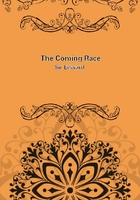
第23章
SINGULAR.PLURAL. Nom.
An, Man,| Nom.Ana, Men. Dat. Ano, to Man,| Dat.Anoi, to Men. Ac. Anan,Man,| Ac. Ananda,Men. Voc. Hil-an, O Man, | Voc. Hil-Ananda, O Men.
In the elder inflectional literature the dual form existed- it has long been obsolete.
The genitive case with them is also obsolete; the dative supplies its place: they say the House 'to' a Man, instead of the House 'of' a Man. When used (sometimes in poetry), the genitive in the termination is the same as the nominative; so is the ablative, the preposition that marks it being a prefix or suffix at option, and generally decided by ear, according to the sound of the noun. It will be observed that the prefix Hil marks the vocative case. It is always retained in addressing another, except in the most intimate domestic relations; its omission would be considered rude: just as in our of forms of speech in addressing a king it would have been deemed disrespectful to say "King," and reverential to say "O King." In fact, as they have no titles of honour, the vocative adjuration supplies the place of a title, and is given impartially to all. The prefix Hil enters into the composition of words that imply distant communications, as Hil-ya, to travel.